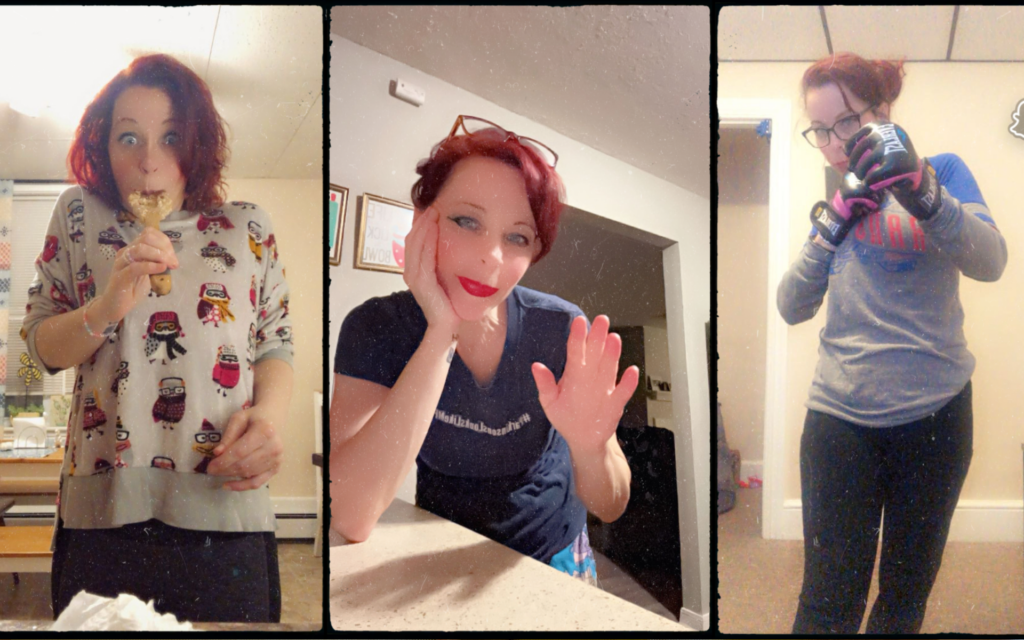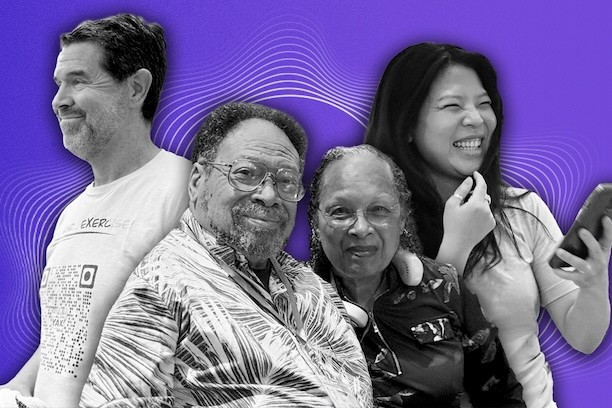Mel Livingston still wonders if the start of her young onset Parkinson’s disease (YOPD) symptoms were triggered by the stress of pregnancy. It was her sixth pregnancy. Her doctors told her, “Your uterus is tired.” When she woke up after a four-hour C-section (a procedure that usually takes under an hour), her doctor was crying. Mel had hemorrhaged; her doctor said, “I wasn’t sure if you would make it.” Mel was 40.
It would take four more years for Mel to get diagnosed. “It was a hectic, hectic time,” she said. Mel, a single mom, had lost her job and lost her health insurance. When she got a new job, she couldn’t afford the insurance they offered. “I was a store manager running three different locations,” she said. “Two of the locations were in New York; I lived in Pennsylvania. There was never enough daycare. I had to work weekends. I had to bring my kids to work sometimes.” By the time she got insurance, again, she was certain something was “very wrong.”
Mel’s diagnosis, in 2020, felt like a “bolt of lightning.” Her grandfather, who passed away over a decade before, had Parkinson’s (PD), but Mel didn’t have any genetic biomarkers for the disease. She’s convinced the cause, for her, is environmental. The school she went to as a kid was across the street from a dry cleaner and down the street from a golf course. New studies suggest that close proximity to a golf course, which is sprayed with chemicals, amplifies your risk of developing PD.
When Mel got home from the neurologist’s office, she went online. “I started Dr. Googling everything,” she said. “Dr. Google was telling me, ‘You’re going to die. You’re only going to live a decade and a half.’ I started to finalize my plans.” But in the midst of her panic, she stumbled upon different information: “You can live a regular life,” it said. Suddenly, Mel had hope.
By the time Mel was diagnosed with YOPD, only her two youngest daughters, including one with autism, were living at home. “I’ve always been a single parent,” she said. “I’ve raised them on my own since conception.” Mel’s mom passed away many years ago and her dad was getting older. She didn’t have a plan B if something happened to her. She called up her oldest daughter: “Let’s talk about these kids.”
Over time, as Mel tapped into more reliable information and realized that Parkinson’s is not a death sentence, she was able to lay down some of her fear. “I don’t worry about the future as much anymore,” she said. “There’s 20 years between my youngest and oldest kids, but they’re close. I know they’ll take care of each other.” Mel also realized that she could do her best to influence the progression of her disease with exercise. “Movement,” she said, “is life.”
But the thing that would truly change the course of her disease came from the last place she expected: TikTok.
The COVID pandemic had locked down the country just before Mel was diagnosed. “There was nothing to do,” Mel said. Her daughter had asked Mel to set up a TikTok account for her and, given that there was nowhere they could go, Mel started “doom scrolling TikTok.” Her daughter would post lip syncing videos and ask her mom to join. Mel wasn’t sure lip syncing was for her. But one day on a whim, Mel thought, why not? She turned up the music and recorded her own video. Her daughter would later tease her, “Mom, this is so cringe.”
Behind the scenes, Mel was reckoning with her disease, trying to process it. She decided to release her pent-up feelings in a video about life with young onset Parkinson’s. “I’ll see if anyone watches this,” she thought. “I can delete it if they don’t.” She just wanted catharsis.
But that’s when it happened: as she continued to post about Parkinson’s, people started watching. And commenting. And reaching out to her. She eventually joined an online support group hosted by Eric Aquino (a PMD Alliance ambassador and founder of The Gray Strong Foundation). The group, which Mel playfully referred to as “Tremble & Sip,” included Chris Sutphin and Esther Labib-Kiyarish. She wouldn’t know it then, but these two would go on to become not only close friends and confidantes, but her co-hosts on PMD Alliance’s and the Young Onset Parkinson’s Network’s podcast, “Living Well Starts Here.” This group would change Mel’s experience. “Before that,” she said, “I couldn’t find anyone my age with Parkinson’s.” She felt alone and just wanted to know if what she was feeling was normal. “Am I crazy,” she said, “or is anyone else out there feeling this?”
Mel wasn’t the only one. The more engaged she became with YOPD TikTok, the more she realized that posting these videos mattered. People would reach out and thank her for sharing what she felt; for the first time, they realized they weren’t the only ones feeling that, either. She, along with other YOPD TikTok influencers, began to pool their knowledge and support. When one man in the Dallas area reached out desperate for an appointment with a deep brain stimulation (DBS) specialist (he couldn’t get an appointment for three years), Mel connected with Esther who connected with a DBS rep in the area and got him in. He had surgery a few months later. “When you post a TikTok video,” Mel said, “you think you’re not making a difference. But there are so many people listening that you don’t know about. The ripple effect is right there.”
Eventually, Mel decided to start gathering posts under a single hashtag: #ParkinsonsLooksLikeMe. It started as a way for her to catalog her posts into an e-journal. She wanted one tag to help her look back on what she’d shared. But, over time, it became something more. “Parkinson’s has so many faces, so many voices,” she said. She wanted the Parkinson’s community to start using the hashtag, too, showing that there is no single definition of a person with PD. Mel was also tired. She was tired of people not understanding what she goes through, tired of explaining it. And tired of living with this disease. She wanted to create a place where people could see what it was really like for her—and for thousands of others.
Today, the #ParkinsonsLooksLikeMe hashtag has over 25 million views and thousands of posts. “It has connected people all over the world,” she said. And it has linked them with resources and knowledge, with PD life hacks, support groups, and doctors. As a steward of this community, Mel has extended the hashtag to PMD Alliance, inviting us to use it and encourage others to join in. As we carry it forward into the world, we promise to honor her intention.
Mel, who is honest, raw, and often a beacon of light on the “Living Well Starts Here” podcast, says she wasn’t always like this. “I was very negative and sarcastic; I had a worst-case-scenario view,” she said. But, over the past few years, this disease and this journey with an unexpected community has moved her. “Now,” she said, “I’m more about letting things sit and letting the universe sort it out for a while. These things were not in my vocabulary before or things I thought I was entitled to—rest, trust, grace. It’s reshaped my entire life.”
In fact, just as much as she has rallied around this community, offering them her time and her care, they have rallied around her. “They’ve helped me see that this isn’t the end of the world, even though it felt like it was...”
For Mel, the last community she could have imagined, or even wanted to be a part of, has changed her life. Out of the tunnels of darkness, we emerge, carried on the backs of community.


